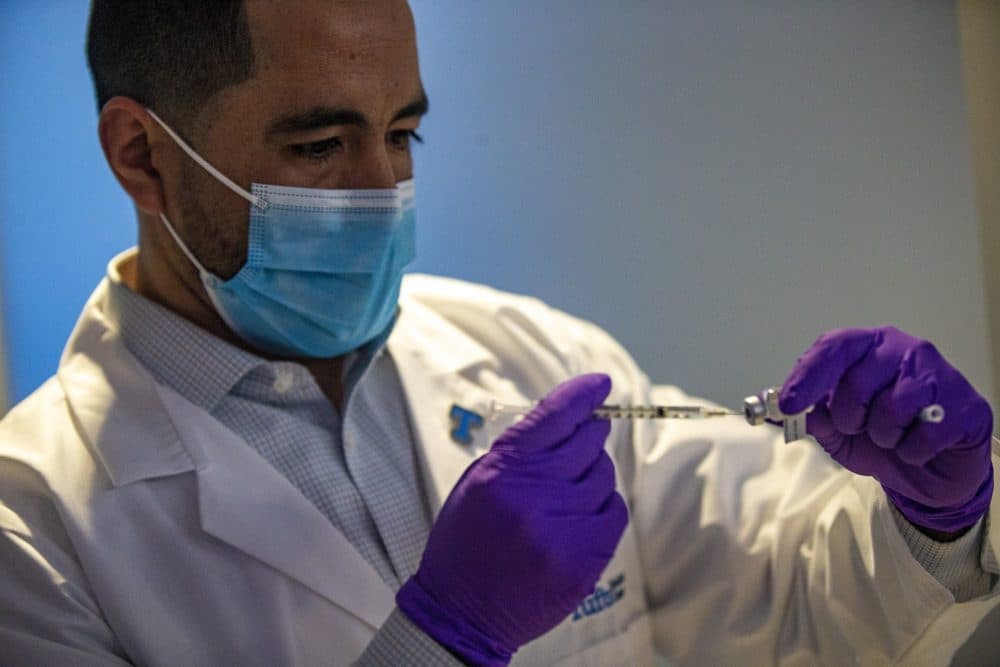Advertisement
How Do Massachusetts And Connecticut Compare On Vaccine Rollout?

According to the latest CDC data, the Bay State ranks 13th from the bottom of states in vaccine distributions, per 100,000 residents. But Connecticut ranks sixth from the top.
Is the Nutmeg State really that much better at rolling this out? What gives? Radio Boston spoke asked WBUR reporter Martha Bebinger and John Dankosky, reporter and host of the podcast "Steady Habits" from the Connecticut Mirror.
Interview Highlights:
Is Massachusetts doing as poorly as the rankings suggest?
Bebinger: "Mass. has injected about 60% of the doses delivered. Now, some of those are appropriately in storage for people who are in line for their second dose. But Gov. Baker said yesterday he is not happy with where we are in this rollout. He was unapologetic, though, for some of the reasons for it, some of the decisions his administration made early on."
Here's a quote from Gov. Charlie Baker explaining his rational during a Wednesday press conference:
"The decision we made to vaccinate straight out of the gate, hospital workers, the decision we made to organize and structure a very significant and complicated outreach program to congregate care providers and the decision we made to choose to be focused early on on homeless people who would not necessarily be part of the rollout in many other places. I think we did the right thing there, but I get the fact that that meant other people needed to wait. And I'm not satisfied with where we are."
Bebinger: "There's a lot of critique of these rankings as well, because some health care leaders who focus on getting vaccines to people of color and some of those underserved populations that the governor was just talking about, we know those people have been at greater risk for infection, hospitalizations and deaths. These leaders say that if you're going to speed up, you're going to vaccinate people who are the easiest to reach. And those are more likely white people than people of color. And so if you're just focusing on speed, you may well end up with even greater inequities due to COVID, meaning more people of color getting sick and dying."
CDC, Bloomberg, Johns Hopkins — their metrics put Connecticut high in the rankings, but optics and reality can be different. So is Connecticut where it looks like it is, or are residents dissatisfied with the rollout?
Dankosky: "Well, right now, I think the governor, Ned Lamont, has been pretty satisfied. ... He's been trying to get the vaccine into the arms of as many people as possible as quickly as possible, because he's very concerned, as we all are, about the variants that have been showing up in various places in the U.S. and certainly other places around the world. At this point, Connecticut has basically prioritized speed. They've said we're going to get this into the arms of, of course, health care workers first, but also those 75 and older. And one of the things that the governor has told us is that's just the most efficient way to get the most doses out to people.
"What Martha talks about is very true. The Connecticut Mirror did an analysis of the population of the state and how exactly this breaks down. And what we found is that 84% of the people 65 and over in the state of Connecticut are white. That's compared to about 66% in the overall population. What that means is that an awful lot of people who are 55 and over, who are Black, who are at much higher risk of of morbidity from this disease, aren't going to get vaccinated as quickly. So that really is the flip side and that's the rub. Do we want to do this fast and get it out to as many seniors as possible? Or do we want to put more younger priority groups first? And Connecticut's kind of made its choice there."
Advertisement
"These [health care] leaders say that if you're going to speed up, you're going to vaccinate people who are the easiest to reach. And those are more likely white people than people of color."
Martha Bebinger, Reporter
We've got this set up of speed and efficiency tends to equal white. Gov. Baker has made strong statements that we were slower in the beginning on purpose to reach more vulnerable people. But there have been logistical challenges, too. Is what Baker said sufficient to explain the ways that we lag?
Bebinger: "Well, no, you're right. There are definitely logistical challenges. You know, there were too many doses going to nursing homes where only about 50% of the staff wanted them; universities and clinics and in some cases got more than they needed and were sitting on them until eligibility groups opened up. You mentioned the clunky registration website at the beginning. And, of course, the big overriding factor is this unpredictable supply and figuring out where to send it on on short notice when the administration figures out how much it's going to get. Of course, the Biden administration is promising to speed that up."
What are Connecticut and Massachusetts doing to address those access issues?
Dankosky: "We've talked to the governor about this, and he's very concerned, too, and I don't want to make this sound like Connecticut does not believe that this is a problem. They absolutely do. Gov. Lamont has addressed this concern over and over again. It's why frontline, essential workers are part of this phase one B; essentially these are folks who are largely Black and brown residents of Connecticut who work in some of these frontline places like grocery stores that need to stay open."
Do we want to do this fast and get it out to as many seniors as possible? Or do we want to put more younger priority groups first? And Connecticut's kind of made its choice there.
John Dankosky, Reporter
"The other thing that the state has done really well in the last couple of weeks, honestly, since nosy reporters like us started asking a bunch of questions about it, is they really have beefed up the phone system, something that was pretty clunky early on for people to register for their vaccines. And they've also done a much better job as far as doses used. ... That number has risen quite a bit from around 60% to 76% in just the last week or so. So it seems as though Connecticut has made a priority recently of trying to solve some of these clunkiness issues for seniors to get appointments and also just to make sure that they're more concerned about using the doses they've got, as opposed to just the overall number of the population that is getting vaccinated."
Bebinger: "The phone system has been a big problem [in Massachusetts], there's an effort to open a phone bank that will hopefully help seniors sign up more quickly. The larger equity response in Massachusetts is focused on geography. It's focused on the hot spots where people have shown they're most likely to be infected, hospitalized and die. And so that means more vaccines to pharmacies in those areas. It means more vaccines to the community health centers that serve those areas and to the local health departments in those cities and towns."
What's the next big challenge to address here in the Commonwealth?
Bebinger: "The supply is the overriding issue. Demand is exceeding supply many fold here. So you have to fix the ways that people are going to get their vaccine with better, more sites, more hours, easier sign up, but then you have to have the supply to meet that demand."
This segment aired on February 4, 2021.


